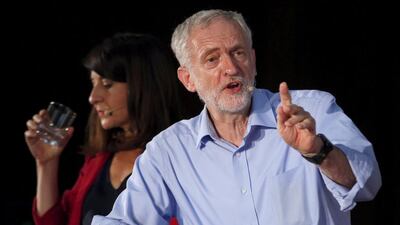Across the northern Anglosphere, the implausible is suddenly looking possible and, in one case even probable. In America, Bernie Sanders, a 73-year-old self-declared socialist who is not even a registered Democrat, is bringing an excitement to that party’s contest for the presidential nomination that the presumed candidate, Hillary Clinton, cannot begin to match. The current Republican frontrunner, meanwhile, is the cartoonish Donald Trump, a reality TV star and real estate billionaire whose ascent may only be stopped if GOP voters realise that his history suggests he isn’t really a conservative at all.
In Britain, Jeremy Corbyn, a hard left MP who has had a beard long enough for it to have come back into fashion, looks likely to become leader of the opposition Labour party.
The top echelons of Britain’s major opposition party used to proclaim they were “intensely relaxed about people getting filthy rich”. Their probable next helmsman, however, is an ascetic vegetarian whose attachment to socialist principles is so strong that his second marriage ended over his then wife’s insistence that their son attend an elite selective school.
All three are denounced as unrealistic, as having programmes that do not add up, as not being serious contenders for power. Britain’s former prime minister, Tony Blair, told off Mr Corbyn’s supporters for living in an “Alice in Wonderland world”.
Yet the much-commented on yearning for authenticity that brought Syriza to power in Greece, and has fuelled the rise of alternative parties of both right and left across Europe, from the Front National in France to the post-communist Die Linke in Germany, reveals a dissatisfaction with mainstream politicians who appear never to dream, even a little.
In most western democracies, the main protagonists give the impression that great gulfs divide them. But those divisions only look big because the ideological spectrum is so small. The mainstream parties all hew to some variant of market capitalism. It is only pugilistic rhetoric that turns disagreements about how to tinker at the edges into political battles in which everything is supposedly at stake.
Former officeholders caution of the need to win and hold “the centre”. But the opportunistic vacuity of taking positions you don’t really believe, but which you think will least offend the majority, appears to have been found out. As the veteran British politician Shirley Williams put it presciently in 1980: a party of the centre would have “no roots, no principles, no philosophy and no values”.
The practical imperative to chase these voters comes from having electoral systems that are geared towards duopolies, and so long as there are only two participants that works well enough for nobody to complain too much. Even so, these systems are still straitjackets, as the two parties will by necessity be broad churches – and this means that the manifestoes presented to the electorate are already compromises.
Once duopolies begin to break down and the voters make clear that they prefer a three, four or even five party system, first past the post elections – as used in both the US and Britain – make no sense at all. They produce bizarrely unrepresentative results, in which parliamentary majorities can be secured on barely more than a third of the vote. This was the case with Mr Blair’s last “victory” in 2005, when Labour won a third term with a mere 35 per cent of ballots cast. (The fact that no British government has come to power with an overall majority of the vote since 1931 ought to raise very serious questions about how democratic UK elections are at all.)
So I am glad that Mr Corbyn looks set to win. Not because I want the Labour party to be unelectable, but because it would be refreshing for people to have the opportunity to vote for a party of the left that unashamedly stands up for its principles. It is true that a fairer electoral system, in which representation was more proportionate, would lead to constant coalitions. But if voters choose to cast their ballot in a multi-party manner, that is the logical and appropriate conclusion.
A Corbyn Labour party might only win, perhaps, 28 per cent of the vote. But if the Liberal Democrats won 15 per cent and the Greens took eight per cent, a coalition could be achieved that represented a majority. Yes, compromises would have to made in forming a government, but they would be made in full view and the parties could be held responsible afterwards. This would surely be better than compromises being made by parties themselves, and the voters’ choice then restricted to only two.
This is the conversation that would have taken place if David Cameron’s Conservatives had not unexpectedly won a parliamentary majority (on 37 per cent of the vote). A coalition would have had to have been formed.
And doing so in a hung parliament with such grotesque disparities between votes and seats – with the SNP winning 56 seats on 4.7 percent, and the Lib Dems only eight on almost double the votes – would have forced a discussion on an electoral system that was clearly broken.
A Corbyn victory ought to bring the issue back into focus. There is a desire for clear-cut choices and for politicians who are unafraid to stand up for what they believe, rather than triangulating to a wishy-washy, ever-shifting centre.
The West has found them in candidates such as Messrs Corbyn, Mr Sanders and Mr Trump. They may be dismissed as mavericks. But if they each arouse the enthusiasm of a significant portion of the electorate – let’s say anything from 15 to 25 percent – and the system can’t fit them in, I would suggest this: there is something wrong with the system, not the people who voted for them.
Sholto Byrnes is a senior fellow at the Institute of Strategic and International Studies, Malaysia


